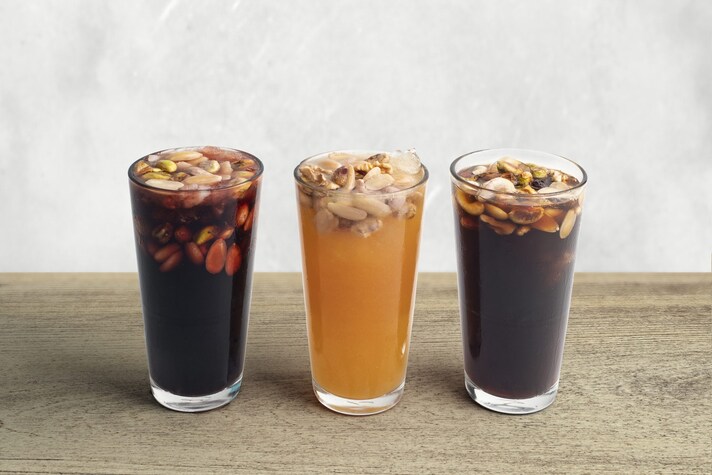10 Things To Know About The Ongoing Ramadan Month
Ramadan consists of various intricacies that may seem strange to non-Muslims. The period is a delicate mix of disciplined observances as well as celebration of longtime tradition. Like you may have already known, the month of Ramadan is simply a period of fasting wherein holiness is revered across all Muslim communities. Below, we have compiled a list of more intricate details to know about the religious period.
;)
The month of Ramadan is observed by Muslims, regardless of wherever they may be across different continents and countries. However, there are slight modifications that are incorporated into the tradition and which may only be peculiar to a particular true or country. Here are 10 exciting things to know about Ramadan:
1. Ramadan is described as the month of giving
During this period, Muslims especially perform charitable acts to help the less privileged around them, whether it's by providing food or money for them. This almsgiving is termed, "zakat," which is one of the five pillars of Islam along with fasting.
2. Fasting during Ramadan is a must, but there are "loopholes"

During Ramadan, Muslims are mandated to keep their thoughts pure, and also abstain from eating, drinking. This period of abstinence also requires that they ditch all forms of "extra" pleasures, including chewing gum, drinking or smoking cigarettes from sunrise to sunset each day.
However, there are special instances when these rules can be broken. For instance, the Quran directs that people who are unwell and/or taking medication, elderly, travelling, pregnant or breastfeeding, as well as children under the age of puberty, can forgo fasting. A fast can also be broken by a woman during menstruation.
3. Fasting takes place during daylight hours
During Ramadan, Muslims fast throughout the daylight hours, which means that during summer months when the days are hotter and daylight stays for longer, the fasting hours are much longer than during winter. This is why salads are commonly served to break fast as they have a high water content and are also very nutritious.
4. Iftar traditions vary in different countries

In some countries, like the United Arab Emirates, Muslims observe iftar with a great feast amidst their family and friends. On the other hand, there are many other countries where the tradition is observed in a reserved manner, and with simple meals.
5. There are two major meals eaten during Ramadan
During Ramadan, Muslims are only allowed to eat two main meals daily. They are the suhoor (served before dawn) and iftar (served at sunset). The suhoor is typically a hearty meal, prepared to provide energy throughout a day of fasting. It ends at sunset and fajr or morning prayer begins. Some choose to sleep rather than prepare food and eat during suhoor.
6. Dates are traditionally the first thing eaten at iftar

In adherence to how the Islamic prophet Muhammad broke his fast, the fast is broken at sunset with a handful of dates and a glass of water before the evening prayer (Maghrib) and the main meal. In middle Eastern countries, a particular favorite is soaking dates in milk overnight while some prefer to eat dates followed by fruit or yogurt.
7. Check local laws before travelling during the Ramadan month
During Ramadan, some Islamic countries prohibit citizens, regardless of their religion, from eating, drinking, smoking or chewing gum in public during daylight, to support Muslims who are fasting. Nowadays, such persons are accommodated at special facilities sectioned off to allow non-fasting people eat and drink privately. So, if you're planning to travel to an Islamic country during this holy month, make sure to check their laws first.
8. Hunger-busting drinks are huge favorites during Ramadan

In the Middle East, there are numerous beverages created not only in accordance with the statutory requirements, but that also largely provide satisfaction. These typically contain a lot of nutrients and fibres which makes them very filling. Examples include the Middle East's jallab, khoshaf and Malaysia's millennial-pink bandung. Cheap alternatives to such exotic drinks are smoothies.
9. Ramadan is brought to a close with Eid al-Fitr
Eid al-Fitr, translates to "feast of breaking the fast," and is a three-day celebration that marks the end of Ramadan. It starts when the new moon is sighted, which means that Eid dates slightly differ around the world. Muslims celebrate Eid with huge feasts, and surrounded by families and friends.
10. Fun fact: weight gain is actually more rampant during Ramadan!

In contrast to the strict period of fast during Ramadan, weight gain actually reaches a surge. This is attributed to binge eating which is fostered by the fast and low activity levels during the day. These factors cause slower metabolic cycles that may cause the body to store fat instead of burning.
In addition, iftar meals are commonly heavy and traditionally high in carbohydrates. So, it is best advised that Muslims incorporate plenty of water, as well as fruits and vegetables into their diet.
;Resize,width=767;)
;Resize,width=712;)
;Resize,width=712;)
;Resize,width=712;)
